|
Manny Pacquiao looked as if he'd had a close call with a machete. There was blood running down his face and onto his chest. As he squinted at the Aussie schoolteacher bullying him around the ring, the roar of the crowd, 51,052 strong, seemed far away, a swarm of bees somewhere off in the distance. It wasn't supposed to be this way. Pacquiao's long summer in the sun is coming to an end, a breathtaking fighter rendered human by the time bomb ticking inside all of us. Matchmaking can be tricky under such circumstances. What seems like easy money can turn out to be a honey trap. 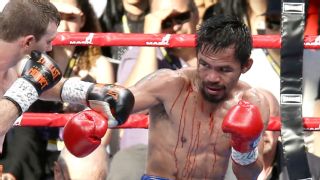 There was nothing easy about Jeff Horn, a relative neophyte with only 17 pro fights going in. He beat Pacquiao by a unanimous but controversial decision in an ugly Australian Rules football kind of fight. Both were bloodied and banged up when it was over. Only one of them was smiling. Pacquiao is going to be 40 his next birthday. The grains of sand in his boxing hourglass are down to a thimbleful. Why then, coming off a loss, is he fighting murderous-punching Lucas Matthysse in Kuala Lumpur on Saturday? He needs the money, that's why. Despite earning hundreds of millions of dollars, Pacquiao's rickety business and financial empire still depends on his boxing income to stay liquid. Without it, the whole shebang probably would collapse like a nipa hut in a typhoon. Matthysse is a dangerous comeback opponent, particularly at this point in Pacquiao's career. But "Pacman" has always been willing to fight damn near anyone and apparently that hasn't changed. He's a real fighter and will knuckle up with anybody. You've got to give him that. Pacquiao's inevitable decline has been in progress for some time. He has camouflaged it the best he can, calling upon the sheer abundance of his gift to fill the gap between illusion and reality. But his margin is becoming thinner and thinner. How could it be otherwise? Pacquiao has been a pro since 1995, fought 455 rounds in 68 bouts against the best in eight weight classes, and won enough belts to build a battleship. The world opened up to Pacquiao and he embraced it for all it's worth. Throughout the foremost portion of his career, he oozed raw aggression and a childlike joy of fighting. We loved him for it, and for quite a while it seemed like his reign of terror would last forever. But it didn't. It never does. The magic fades bit by bit until one day, poof, it's gone. 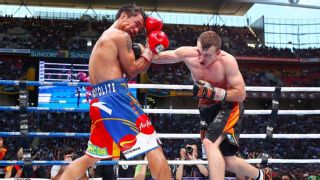 In his most recent bout before the loss to Horn, Pacquiao had enough left to win a comfortable 12-round unanimous decision over Jessie Vargas in November 2016. The Pacquiao who beat Vargas probably would have also beaten Horn, but he wasn't in Brisbane's SunCorp Stadium on the afternoon of July 2, 2017. A different version showed up and lost. The Pacquiao of the Horn fight was considerably slower, his timing was dreadful, and the multipunch combinations that buzzed and bewildered so many adversaries were noticeably absent. His legs, the unsung hero of his success, appeared to have lost much of their bounce. It's possible that the final glimpse of the magnificent fighter Pacquiao was for so many years came in the ninth round, when he hurt Horn with a left. The Filipino icon suddenly forgot how weary and frustrated he felt and willed himself back to a place he hasn't visited in years. It wasn't prime-time Pacman, not even close, more squall than typhoon. But he battered Horn severely enough that referee Mark Nelson visited the Australian's corner after the round was over and told him he wasn't going to allow him to take much more punishment. He need not have worried. There was no follow-up. Pacquiao was spent and didn't have another onslaught in him. Fumes and pride got him to the finish line. 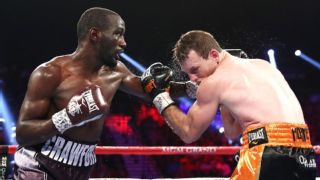 A lot of people outside Australia thought Pacquiao won, and maybe they're right. Even so, there's no getting around how abysmal he looked, an appraisal accentuated by Terence Crawford's subsequent TKO of Horn. They say the fighter is always the last to know he's slipping, but it's not true. They're the first to know but are afraid to acknowledge it, even to themselves. To do so would be to surrender all they know and who they are. Pacquiao isn't stupid. He knows he's nowhere near the fighter he was in his prime, but he's not going to admit it. Right now he's in the "just a few more fights" mode. He has been there quite a while. A fighter's career is finite, but they don't all slow down or dissipate at the same rate or to the same degree. There's no collapsing en masse like toy soldiers. The majority stays too long, but the most resourceful adapt and prosper. Pacquiao was one of them. He made the right modification at the right times -- slowing down the pace, not lingering in the pocket so long and attacking judiciously. The ferocious, devil-may-care knockout artist morphed into "Pacman Lite". Some of the greatest fighters, Joe Frazier and Roy Jones Jr., for example, couldn't adjust. Others such as Evander Holyfield, Oscar De La Hoya and Larry Holmes simply fought on as faded versions of their younger selves. That's what seems to happen to most, providing they don't get pounded into Silly Putty first. The last time we saw Pacquiao anywhere near his best was during the final minute of his fifth fight with Juan Manuel Marquez. Often overlooked in the excitement created by Marquez's chilling one-punch knockout is the fact "Dinamita" was hurt and in serious trouble when he landed the biggest punch of his career. 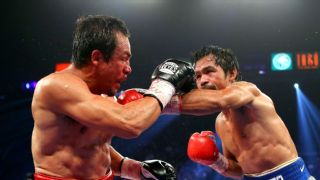 The old gunslinger "Pacman" was back, but only for a fistful of seconds. Marquez simply beat him to the draw. That was six years ago, and although Pacquiao's thrill factor has steadily declined, he has made a boatload of money since Marquez left him face down on the canvas. Pacquiao's image has hardened in recent years. His insensitive remarks about the LGBT community cost him some fans, and his friendship with the Philippine's autocratic president, Rodrigo Duterte, is downright disheartening. Nevertheless, Pacquiao the fighter remains forever golden. The marvel he was from, say, 2001 through 2010, was a once-in-a-lifetime phenomenon -- a charismatic and carefree knockout machine that knew no fear. Today, Pacquiao is an elected member of the Philippine Senate with several years left on his current term. These days he's dressed in a suit and tie far more often than boxing trunks. Whether the tens of millions of dollars he has spent building his political career will eventually pay off remains a Machiavellian crapshoot. Politics in the Philippines is dangerous business, filled with menacing players and shifting allegiances. Power is wielded with all the subtlety of a machine-gun blast in the middle of the night. Life is cheap. Corruption is rampant. 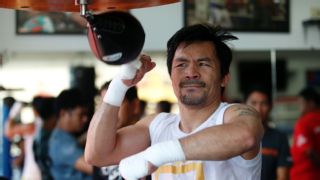 Pacquiao is already in pretty deep, and his post-boxing career in the political cockpit is going to be fascinating. But for the time being, boxing's money train keeps on rolling. Next stop, maybe the last stop, Malaysia. Pacquiao is in peril of becoming a wilted version of his reinvented self. If he can't fight any better than he did against Horn, Matthysse is capable of inflicting career-ending damage. Still, Matthysse wasn't that impressive in his two comeback wins since getting stopped by Victor Postol in 2015. Emmanuel Taylor was a gimme and Matthysse looked lethargic before knocking out obscure contender Tewa Kiran. All indications are that Pacquiao and Matthysse are both past their prime, but that's not necessarily a bad thing. Some of boxing's greatest fights were between fighters who had seen better days. The "Thrilla in Manila" is the textbook example. Muhammad Ali and Joe Frazier were on the wrong side of the hill by 1975, but nobody gave a damn when the fight started. Some think it was the best ever. This is not to suggest that Pacquiao-Matthysse is on the same level as Ali-Frazier III, but it's an intriguing match with a promising mix of styles. With a bit of luck, it could be a pleasing fight, the sort that brings out the best of the combatants, regardless of where their careers currently stand. The bigger and ultimately more significant story, however, is the approaching end of a fabled career. There never has been a fighter quite like Pacquiao, and it's unlikely there ever will be again, not for a long while, anyway. He's the Horatio Alger of the Philippines, a transcendent figure, future Hall of Famer, and perhaps, as promoter Bob Arum has predicted, eventually president of the Philippines. But first there's a tattooed bruiser from Argentina with whom to deal. If Pacquiao beats Matthysse, he could decide to cash out with a monster payday against Crawford, which is what Arum seems to crave. Pacquiao? He just wants the money. The rest will take care of itself.
|
